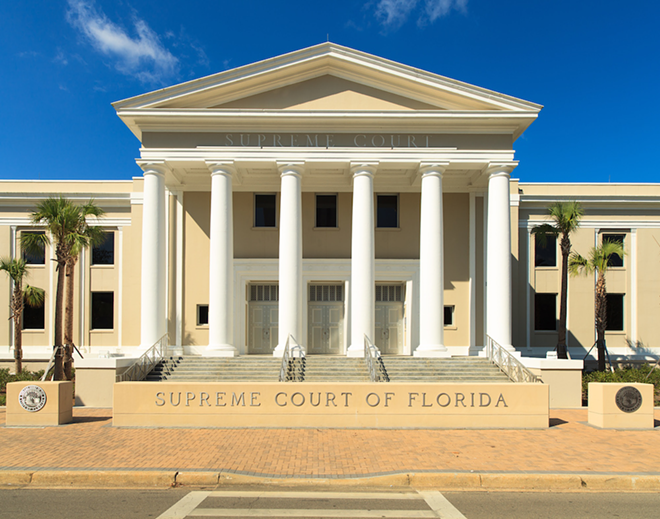In its second reversal of a major criminal-justice decision, the Florida Supreme Court ruled Thursday that juveniles can be sentenced to terms longer than 20 years in prison without the opportunity for early release.
The 4-1 decision stunned public defenders, who expressed concern not only about its implications for juvenile sentencing but also about a reshaped court emboldened to revisit issues the legal community had considered settled.
The ruling in the case of Linda Pedroza is rooted in two seminal U.S. Supreme Court decisions that found life sentences for juveniles violate Eighth Amendment protections against cruel and unusual punishment.
In a 2010 case, known as Graham v. Florida, the U.S. Supreme Court banned life sentences without a "meaningful opportunity" for release for juveniles convicted of non-homicide crimes. And in a 2012 ruling known as Miller v. Alabama, the high court barred mandatory life sentences for juveniles convicted of murder. Juveniles can still face life sentences in such cases, but judges must weigh criteria such as the offenders' maturity and the nature of the crimes before imposing that sentences.
The Florida Legislature revamped sentencing laws for juveniles in 2014. In a series of rulings the following year, the Florida Supreme Court ordered judges to apply the laws retroactively to inmates who, as juveniles, had been sentenced to life in prison or to terms that would have effectively kept them behind bars until they die.
Pedroza was 17 when she and her boyfriend killed Pedroza’s mother in Palm Beach County. In 2003, Pedroza accepted a plea deal and was sentenced to 40 years in prison for the murder.
Lawyers for Pedroza, now 37, asked the court to revisit her sentence, arguing that the 40-year term was unconstitutional because the lengthy term was imposed without individualized consideration of her youth.
The state maintained that the sentence was not problematic because Pedroza would be 55 when she is scheduled to be released from prison. The 4th District Court of Appeals upheld the sentence, finding there was no “clear, binding Florida Supreme Court decision that requires resentencing.”
The appeals court also asked the Supreme Court to weigh in on the issue to settle conflicts with other district courts, which mostly required resentencing in cases in which sentences were equal to or less than Pedroza’s.
The Florida Supreme Court on Thursday sided with prosecutors and the lower courts, finding that the 40-year sentence is constitutional.
“In so holding, we conclude that, to the extent this (Supreme) court has previously instructed that resentencing is required for all juvenile offenders serving sentences longer than 20 years without the opportunity for early release based on judicial review, it did so in error,” Justice Alan Lawson wrote in a 15-page opinion joined by Chief Justice Charles Canady and justices Ricky Polston and Carlos Muñiz.
Justice Jorge Labarga dissented.
Thursday’s ruling also backed away from a series of Florida Supreme Court decisions “to the extent they hold that resentencing is required for all juvenile offenders serving a sentence longer than 20 years without the opportunity for early release based on demonstrated maturity and rehabilitation.”
The court majority found the judge who sentenced Pedroza to 40 years in prison did not err, even though the juvenile’s level of maturity was not taken into consideration.
“Although the trial court in this case did not give individualized consideration to Pedroza’s youth and its attendant characteristics when deciding to sentencing her in accordance with the parties’ agreement, her sentence is not unconstitutional under Miller because it is not a sentence of life imprisonment,” Lawson wrote.
In his dissent, Labarga disagreed with the majority “because of the disproportionate result” in Pedroza’s case.
“Ironically, if Pedroza had pleaded guilty to first-degree murder and received a mandatory life sentence, she would actually be in a better position because she would have been entitled to resentencing … and she would have been eligible for judicial review of her sentence after 25 years,” Labarga wrote.
The Pedroza decision punctuates the sharp ideological shift on the court following Gov. Ron DeSantis’ appointment last year of three justices to replace members of a liberal-leaning majority who for years maintained a firm hold on the court. The appointments came because former justices Barbara Pariente, R. Fred Lewis and Peggy Quince hit a mandatory retirement age.
In January, the revamped court made a major reversal when it ruled that unanimous jury recommendations are not necessary before death sentences can be imposed.
The two turnarounds are a marked departure from “stare decisis,” the concept of relying on court precedents and could signal future changes in case law that had been considered settled.
The Pedroza ruling “is the second case in as many months where this new Supreme Court composition has reversed precedent by just saying, oh, they were wrong,” 8th Judicial Circuit Public Defender Stacy Scott told The News Service of Florida in an interview.
“It’s disregarding precedent that’s the scariest part of this ruling to me,” said Scott, whose judicial circuit includes Alachua, Baker, Bradford, Gilchrist, Levy and Union counties. “Because if that’s what this court is going to do, then they can do it on any type of case that they want to, including cases on reproductive rights. … It seems to me that this is judicial activism at its worst --- disregarding precedent and the respect that our laws have for stare decisis.”
The decision in the Pedroza case ignores research that led the U.S. Supreme Court to do away with lifetime incarceration for juveniles, except in rare circumstances, Scott said.
“It’s a reversal not just in law, but it’s a regression of our views of juvenile offenders,” she said.
Follow @cl_tampabay on Twitter to get the most up-to-date news + views. Subscribe to our newsletter, too.


